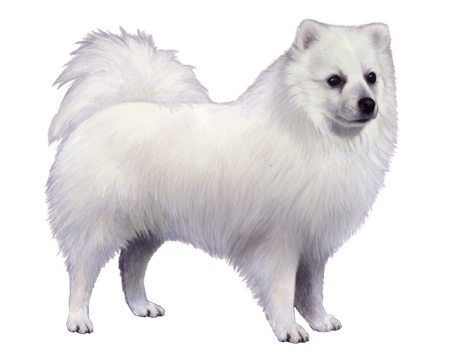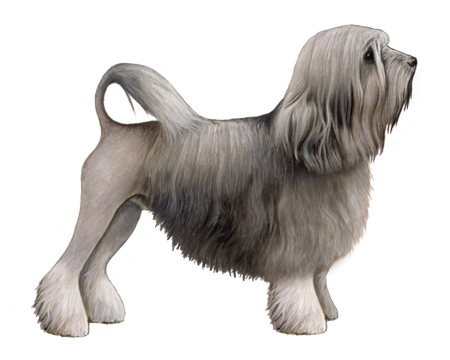
Bichon Frise
Bichon Frise means "curly lapdog"—a fitting name for a plush-coated breed that loves to snuggle up to its family. Bichons are famous for their pep, curiosity, charm, and outgoing personalities.
Interested in discovering if your dog is a Bichon Frise?
Check out Wisdom Panel's DNA tests.

Bichon Frise Traits
General Appearance
The Bichon Frise is a compact, sturdy dog with a merry temperament, plumed tail, and inquisitive expression.
Coat and Colouring
The texture of their hair—often compared to plush or velvet—comes from their soft, dense undercoat and coarse, curlier outer coat. The Bichon Frise's hair is fluffy, giving it a "powder puff" appearance. A solid white color is preferred under the breed standard. But shadings of buff, cream, or apricot are possible.
Distinctive Physical Traits
Bichon Frises are a little longer than they are tall—with compact, medium-boned bodies, and plumed tails. Their round, dark eyes have black or dark brown skin surrounding them, which accentuates their bright and inquisitive expressions.
Bichon Frise Temperament
Known for their gentle manners, playful spirits, and unbridled affection, Bichon Frises easily win over people and animals. A cheerful attitude is a hallmark of the breed.
These active, outgoing dogs make excellent family pets. But like all small breeds, they should be monitored around children to avoid accidental injuries. A sensitive breed, Bichon Frises prefer hugs and kind words to harsh discipline.
Apartment living suits the Bichon Frise due to its compact size, minimal exercise needs, and calm demeanor. Just don't leave a Bichon home alone for too long. These small dogs can get into big trouble if they become bored or anxious after long stretches without companionship.
Despite their small size, the Bichons can make excellent, confident watchdogs. But don't expect them to do more than sound the alarm if they sense something is amiss. The breed is far too friendly to be a good protector.


Bichon Frise History
Belonging to a group of small white dogs called Barbichon (later shortened to Bichon), the Bichon Frise is related to the Bolognese, Havanese, and Maltese.
The Bichon Tenerife—a dog popular with sailors on the island of Tenerife—developed into the current Bichon Frise and became the preferred breed of nobles in the 1200s. These dogs served as faithful companions to members of the royal courts across Europe. In France, rumor has it that King Henry III was so enamored with his Bichon that he carried it around in a basket wherever he went. So, it seems fitting that the breed inspired the French word bichonner, meaning "to make beautiful, to pamper."
When their wealthy owners got the guillotine during the French Revolution, Bichons lost their place of privilege. Fortunately, the adorable, easily trained little dogs caught the eye of street performers—who taught them tricks to earn the spare change of passersby.
Bichon Frises captured hearts and soon transitioned from the streets into loving homes. In 1933, the Societe Centrale Canine in France recognized the breed as the Bichon a Poil Frise. Since then, it has become a popular breed in the non-sporting group, delighting families worldwide.
Bichon Frise Care
Nutrition
Bichon Frises require high-quality dog food that matches their life stage (e.g., puppy, adult, senior). Consider a diet specially formulated for small breeds.
To ensure your Bichon doesn't become overweight, monitor their food intake carefully. Measuring out meals can help avoid accidental overfeeding. And remember that treats should make up no more than 10% of a dog's calories.
Grooming
The Bichon Frise is a relatively hypoallergenic breed that sheds very little. Still, these dogs' coats are far from low-maintenance. In addition to daily brushing, they require a bath and professional grooming every month or so to maintain their signature powder puff appearance.
Bichon Frises also need regular nail trims and ear cleanings. And routine dental care—including at-home teeth brushing and professional dental cleaning—is essential for the long-term health of all dogs, regardless of breed.
Exercise
While a Bichon Frise might love curling up on a lap, these dogs are not couch potatoes. The Bichon is relatively active and thrives with regular walks and off-leash play sessions (in secured outdoor areas).
An outgoing nature makes the Bichon Frise an ideal breed for the dog park or doggie daycare. These intelligent dogs also enjoy learning tricks and perform well in dog sports—such as agility, rally, and competitive obedience.
Training
Although the Bichon is intelligent and learns quickly, the breed has a reputation for being difficult to housebreak. During training sessions, focus on reward-based techniques and offer praise, toys, and treats to encourage desired behaviors. Steer clear of harsh reprimands—the Bichon Frise is a sensitive breed that prefers positive interactions.

Bichon Frise Genetic Health Conditions
-
Chondrodystrophy (CDDY) and Intervertebral Disc Disease (IVDD) Risk
Chondrodystrophy (CDDY) is a skeletal disorder characterized by shortened limbs and abnormal early degeneration of the spinal discs, or intervertebral disc disease (IVDD), which predisposes to disc herniation.
Knowing if your Bichon Frise is a carrier or at-risk for these conditions can help you and your veterinarian plan for your pup's lifelong care. With Wisdom Panel™ Premium, you can get results for over 200 genetic health tests.
Breed Group
Companion
This group consists of dogs typically bred for the specific purpose of human companionship, and many are popular pets because of their gentle nature. They became more common as the concept and luxury of dogs as pets prevailed.
Resources
https://bichon.org/history-of-the-bichon-frise/
http://images.akc.org/pdf/breeds/standards/BichonFrise.pdf
Reviewed 26 July 2020 by Laura Inman, DVM



























_Color.png)










